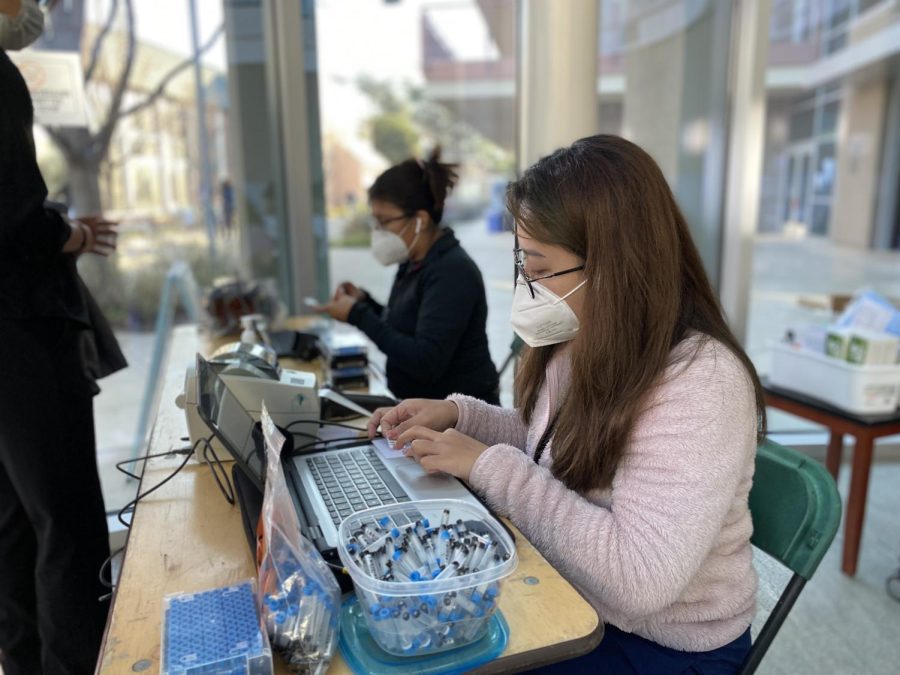More contagious omicron subvariant BA.2 spreads as mask mandates lift
A technician from Inspire Diagnostics applies a sticker to a mini test vial in the Rotunda, the upper school’s COVID-19 testing site, on Feb. 4. BA.2 received the title “stealth variant” due to unique genetic traits that make it difficult to trace since it often appears as the delta variant in tests.
March 9, 2022
The omicron subvariant BA.2 has appeared in over 40 countries, including the U.S, and is much more contagious than its predecessor.
As BA.1, or omicron, cases decline, states such as California, Oregon and Washington have lifted school mask mandates even for the unvaccinated. Similarly, New York, Nevada and Illinois have lifted their mask mandates. Despite suggestions from the Centers for Disease Control and Prevention (CDC) to stick to mask mandates, states refused to do so as COVID-19 cases in the U.S. have decreased by 50% and hospitalizations by 30% in the last three weeks.
“People just want to go back to normal,” Public Health Club co-president Kevin Wang (12) said. “I think that’s why a lot of the governors are removing the mandate, but we should also still be taking precautions. New variants can definitely pop out and we should monitor that and make sure we are constantly adjusting our policies to any new information that we have.”
With the rise of the new subvariant, upper school biology teacher Eric Johnson feels as though decreased masking will have more severe repercussions than initially believed as vaccinations country-wide are still low at 64.8%. At Harker, 96.8% of students are vaccinated while 97.8% of teachers are.
BA.2 received the title “stealth variant” due to its unique genetic traits that make it difficult to trace. Polymerase chain reaction (PCR) tests check for “S gene target failure” to identify omicron cases, but BA.2 lacks the gene, so it often appears in data as the delta variant. Misidentification of variants can lead to a false interpretation of symptoms and faulty data.
Current vaccines are as effective against still combating BA.2 as BA.1, which the vaccine had 90% efficacy against, but as more variants arise, vaccines will no longer retain their efficacy against them. The cause lies in the development of vaccines.
Once a vaccine enters the body, it triggers cells to create spike proteins, which also exist on the surface of the COVID-19 virus. These cells then destroy and remove the protein’s mRNA and display the spike proteins on their surfaces. The body’s immune system will then identify the spike protein as an intruder and activate immune cells to combat the virus, but the vaccine only instructs the body to produce a specific spike protein, so as more variants arise, that protein mutates. As a result, its presence will go unnoticed, and the immune system will fail to fight it off.
“If we’re allowing [spike proteins] to mutate, they’re changing the mechanism by which they get into our cells, which is the scary thing,” Johnson said. “We build our vaccines against those spike [proteins], so what happens if they start changing what they look like all of a sudden — like if they’re not wearing a giant mustache anymore — what happens to our vaccines? They don’t work.”
As of mid-November last year, more than 36 countries have reported 15,000 sequenced cases of BA.2 to the Global Initiative on Sharing All Influenza Data (GISAID), and 96 of them came from the U.S. Currently, the mutant has more presence in Asia and Europe, with Denmark labeling 45% of their COVID-19 cases as BA.2 halfway through January. Denmark also reported that they expect all of their omicron cases to comprise of BA.2 by mid-February.
In January, schools across the country reverted to remote learning to prevent transmission of omicron, but Harker remained in-person and took other measures to keep students safe, such as moving all class and school meetings online as well as weekly testing on Fridays. According to upper school nurse Jennifer Olson, school meetings will continue this way, but class meetings can now either take place over Zoom or in-person.
As of this week, students can also choose to dine indoors in Manzanita. Since BA.2 is more contagious than BA.1, Health Occupations Students of America (HOSA) club member Vika Gautham (9) wonders whether students and staff should return to online school if the situation were to escalate.
“I do hope we will still stay in person because in online [school], you get fatigued easily and it’s not as great as learning in person,” Vika said. I think it’s great that we’re doing class meetings and school meetings from advisory now.”
Johnson believes that Harker’s strong communication and resources will prevent the school from returning to remote learning even with the BA.2 surge. They noted that Harker is doing particularly well with cases with only 76 upper school students and 31 staff members having tested positive for COVID-19.
“It’s scary, but I think there’s a trust we have when we come here that’s like, ‘I’m safe in this community,’” Johnson said. “Since there are a lot of people who are vaccinated, and we’re getting tested, and they’re telling us when things are happening, I do feel safe in this community and that’s a privilege.”


















![“[Building nerf blasters] became this outlet of creativity for me that hasn't been matched by anything else. The process [of] making a build complete to your desire is such a painstakingly difficult process, but I've had to learn from [the skills needed from] soldering to proper painting. There's so many different options for everything, if you think about it, it exists. The best part is [that] if it doesn't exist, you can build it yourself," Ishaan Parate said.](https://harkeraquila.com/wp-content/uploads/2022/08/DSC_8149-900x604.jpg)




![“When I came into high school, I was ready to be a follower. But DECA was a game changer for me. It helped me overcome my fear of public speaking, and it's played such a major role in who I've become today. To be able to successfully lead a chapter of 150 students, an officer team and be one of the upperclassmen I once really admired is something I'm [really] proud of,” Anvitha Tummala ('21) said.](https://harkeraquila.com/wp-content/uploads/2021/07/Screen-Shot-2021-07-25-at-9.50.05-AM-900x594.png)







![“I think getting up in the morning and having a sense of purpose [is exciting]. I think without a certain amount of drive, life is kind of obsolete and mundane, and I think having that every single day is what makes each day unique and kind of makes life exciting,” Neymika Jain (12) said.](https://harkeraquila.com/wp-content/uploads/2017/06/Screen-Shot-2017-06-03-at-4.54.16-PM.png)








![“My slogan is ‘slow feet, don’t eat, and I’m hungry.’ You need to run fast to get where you are–you aren't going to get those championships if you aren't fast,” Angel Cervantes (12) said. “I want to do well in school on my tests and in track and win championships for my team. I live by that, [and] I can do that anywhere: in the classroom or on the field.”](https://harkeraquila.com/wp-content/uploads/2018/06/DSC5146-900x601.jpg)
![“[Volleyball has] taught me how to fall correctly, and another thing it taught is that you don’t have to be the best at something to be good at it. If you just hit the ball in a smart way, then it still scores points and you’re good at it. You could be a background player and still make a much bigger impact on the team than you would think,” Anya Gert (’20) said.](https://harkeraquila.com/wp-content/uploads/2020/06/AnnaGert_JinTuan_HoHPhotoEdited-600x900.jpeg)

![“I'm not nearly there yet, but [my confidence has] definitely been getting better since I was pretty shy and timid coming into Harker my freshman year. I know that there's a lot of people that are really confident in what they do, and I really admire them. Everyone's so driven and that has really pushed me to kind of try to find my own place in high school and be more confident,” Alyssa Huang (’20) said.](https://harkeraquila.com/wp-content/uploads/2020/06/AlyssaHuang_EmilyChen_HoHPhoto-900x749.jpeg)












